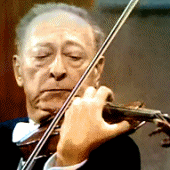![]()
|
JASCHA HEIFETZ 86, DIES, HAILED AS Los Angeles Times (c) 1995 Los Angeles Times. All rts. reserv. Jascha Heifetz, a Russian child prodigy who became the world's highest- paid violinist by age 18 and continued to grow in stature as he toured the world and taught his "perishable art," has died in Los Angeles, officials said today. He was 86. Heifetz died late Thursday at Cedars-Sinai Medical Center, where he underwent neurosurgery, hospital spokesman Ron Wise said. He was hospitalized Oct. 16 due to complications arising from a fall, Wise said. Heifetz had improved around Thanksgiving, "but he never improved enough to be released," Wise added. Isaac Stern, himself a renowned violinist, said today in London: "Since his debut in the United States, he was the most powerful force in violin playing in the world. He has been in the inner ear of every violinist since at least 1930." "What he meant to violin-playing cannot be measured," violinist Itzhak Perlman added. "Ever since I can remember, he was the top, the epitome of what incredible violin playing meant." Carnegie Hall Debut Heifetz's American debut was at New York's Carnegie Hall in 1917 and reviewer Sigmund Spaeth wrote in the Evening Mail: " . . . a tall Russian being with a mop of curly hair walked out on the stage of Carnegie Hall and made the ideal a reality." He quickly became famous and began a series of world tours that took him to virtually every major city. Within two years of his U.S. debut, he was the highest paid violinist in history, getting $2,250 for a concert. Asked once why he had no autobiography, he said, "Here is my biography. I played the violin at 3 and gave my first concert at 7. I have been playing ever since." His last solo concert came in 1972 with a performance at the Los Angeles Music Center during which his final words to the audience were, "I am pooped." His last public performance was in 1974. Born in Vilna, Russia, on Feb. 2, 1901, Heifetz took lessons with his father as a child. By age 7 he was playing in public, and at age 9 he was accepted by Leopold Auer at the St. Petersburg Conservatory and had his first recital. Heifetz went on to play Mendelssohn and Tchaikovsky concertos in Europe when he was 11. Becomes U.S. Citizen The 1917 Bolshevik Revolution signaled the end of Heifetz's stay in his homeland. He traveled to this country and became a U.S. citizen in 1925. In 1953, the virtuoso was assaulted by an Israeli youth wielding an iron bar who was reportedly angered by Heifetz's decision to play German songs. He defended his choice of music, saying that artistic considerations were the only deciding factors in determining a musical program. Most recently, he taught violin through the extension program at UCLA and at the USC School of Music. Heifetz was bitter when USC dropped his master's program, but campus officials lauded his work and blamed the program's demise on funding problems. In 1968, in an interview with The New York Times, he explained why at that time he had not appeared in a solo recital for 13 years: "I've had my share of touring. I have no further interest in that kind of career. And I can't say I admire the pace at which today's musicians travel . . . ; they don't pause to reflect." Heifetz was married twice, but both marriages ended in divorce. Erick Friedmann: “He was able to bring into definition a universe of violinistic meaning heretofore unheard, even unknown.” Perlman: “There is no question of Heifetz’s influence through recordings, not only on my playing but on that of any violinist. I consider him to be the father of modern violin playing; not only of modern violin playing but of modern virtuoso violin playing.” Vengerov: “The name Jascha Heifetz is very symbolic - not only to violinists but for all musicians - as an example of unselfish service to art. He is an inexhaustible source of knowledge of every violinst.” Stern: “He advanced the limits of technical mastery beyond anything that we knew from personal experience before or since. His inimitable grace, the soaring clarity of his tone and the unique quality of that astonishing left hand were instantly recognisable and have not been equalled. For many of us in this era, Jascha Heifetz was, indeed, THE VIOLIN.” |
|






